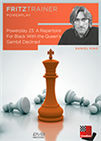A dominant player
 By Padmini Rout
By Padmini Rout
When I was a kid, random adults would sometimes ask me if I knew Sultan Khan — I would say yes, despite it being just a name I had heard growing up but knew nothing beyond. So, when the book about Sultan Khan by Daniel King came out recently, I was curious to read it, and to my luck a friend gifted it to me on my birthday.
Sultan Khan, like me, learnt the game of chess at the age of 9 from his father. Like him, one of the first persons whom I played chess against (Satya uncle) would ask me — do you want to play with the Indian rules or Western, and I would say Western (having absolutely no idea what the Indian rules were, as back then it seemed obsolete and unimportant to me to learn it).
Satya uncle left for the heavenly abode last year, and now I can only imagine how our games would have proceeded if I had agreed to play with the Indian rules — perhaps I would have been a bit less reckless with the pawns. According to Indian rules, the pawns could only move one square at a time from their initial position and there was no castling, while the king had a superpower only once during the game to move like a knight provided it had not been checked earlier, plus a few other interesting rules.
The book and Sultan Khan’s chess progress follow the Indian Freedom struggle. In fact, you will recognize some names from your history books, like that of chess enthusiast Sir John Simon, who played a role in Sultan Khan’s career.
One theme you will find in abundance going through the games is Sultan Khan’s skilful ways of domination over the opponent’s pieces. Consider this position:
 On this DVD Grandmaster Daniel King offers you a repertoire for Black with the QGD. The repertoire is demonstrated in 10 stem games, covering all White's major systems: 5 Bg5, 5 Bf4, and the Exchange Variation.
On this DVD Grandmaster Daniel King offers you a repertoire for Black with the QGD. The repertoire is demonstrated in 10 stem games, covering all White's major systems: 5 Bg5, 5 Bf4, and the Exchange Variation.
They say chess imitates life, which made me think of Sultan Khan. Was he trying to compensate for what he couldn’t do in life? Sultan, after all, means King.
Here is a technical win:
And the famous one, in the spirit of the Indian rules of chess. This is the very first game from the book:
 I enjoyed learning about Sultan Khan and many other chess personalities of the past. There are many interesting stories, and you will not only find Sultan Khan’s games against World Champions as Alekhine, Capablanca and Euwe, but also the likes of Conel Hugh O’Donel Alexander, the player behind the GM character in The Imitation Game!
I enjoyed learning about Sultan Khan and many other chess personalities of the past. There are many interesting stories, and you will not only find Sultan Khan’s games against World Champions as Alekhine, Capablanca and Euwe, but also the likes of Conel Hugh O’Donel Alexander, the player behind the GM character in The Imitation Game!
Thanks to the book now I know how strong a player Sultan Khan actually was! It was such a long time ago, but reading about the death of Fred Yates [pictured] brought me tears. I hope Sultan Khan is given the GM title posthumously, much like Yates and C.H.O’D Alexander! If fictional characters can be given GM titles, then why not real life chess heroes?
I guess the true power of a human life is that we can connect across different times, ages, oceans.
Oh, and the book reminded me to watch the movie Shatranj Ke Khilari. Off to it!
P.S. Thanks for reading the article! Please let me know if you enjoyed reading it, and if it makes you want to read the book now, that will encourage me to write more.
This DVD allows you to learn from the example of one of the best players in the history of chess and from the explanations of the authors how to successfully organise your games strategically, and how to keep your opponent permanently under pressure.
Links


















 By Padmini Rout
By Padmini Rout




